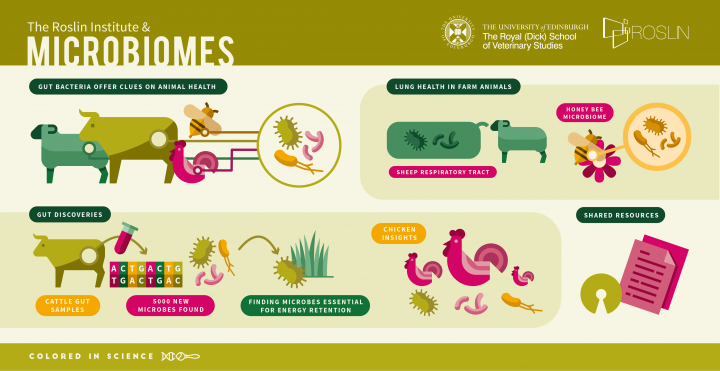Gut bacteria offers clues on animal health
Insights from investigating the microorganisms living in cows, sheep, chickens and bees.

Understanding more about the microorganisms that live in animals’ digestive systems – the gut microbiome – can give valuable insight into health and productivity.
The microbiome is key to enabling animals to obtain nutrition from their diet and, in the case of cows, sheep and other ruminants, also affects how much methane – a key greenhouse gas – they generate.
The combination of organisms also influences the development of the immune system, helps to exclude pathogens, and acts as a reservoir of antibiotic resistance genes.
Cattle gut discoveries
In a study into cattle, scientists discovered almost 5,000 new microbes by sequencing all the DNA present in gut contents. This finding could improve meat and dairy yields, and cow health.
The findings build the clearest picture yet of how the microbes in a cow’s rumen – the first of its four stomachs – help cattle to digest and extract energy from their food.
Pinpointing which microbes are essential for energy retention from the diet and gut health could inform future breeding programmes for health, productivity and low greenhouse gas emissions.
The findings provide powerful resources for industrial biotechnology, and have led to a collaboration with the company Ingenza towards novel molecules for biofuel production.
Lung health in farm animals
Researchers developed a non-invasive method to study microbes in sheep breath, which showed that, in contrast to humans, the microbes in the lower respiratory tract vary from those of the upper tract.
This will inform ongoing research to understand seasonal outbreaks of ruminant respiratory disease.
In chickens, researchers discovered differences in the location and types of microbes in the respiratory tract, depending on the age of birds.
Roslin is also carrying out industry-linked work which is revealing associations between gut microbes and characteristics in broiler chickens – those bred for meat. This could have implications for gut health and growth promoted by antibiotics added to chicken feed.
Studies into the links between age and immune function have been inspired by mouse studies that showed transfer of gut microbes from young to aged mice increases the abundance and function of some immune cells.
Protecting bees
Roslin scientists, in a collaboration with researchers in the University of Edinburgh’s School of Biological Sciences, analysed the genetic make-up, including the microbiome, of UK honey bees. Their findings could help to safeguard native bee populations – a key pollinator – from the effects of infectious diseases through improved health monitoring.
The composition of these beneficial bacteria, pests and pathogens is important to the wellbeing of bees and this approach can give valuable information about the health status of the bees, and potentially identify new pests and diseases.
Shared resources
Roslin scientists have published an open source pipeline for the analysis of the composition and functions of microbiomes, and guidelines on best practice to reduce bias in studies of the microbiome.
Details of the genomes of thousands of microbes discovered in farm animals have been made publicly available and will be a valuable resource for future studies.
Related links
DNA study of cow stomachs could aid meat and dairy production
Cow gut DNA study could help improve meat and dairy
Award winning research could pave the way for low-emission cattle
How genetics could help our honey bees
Gene study boosts bid to keep British bees safe from disease
Graphics by Elena Bernabeu at Colored In Science


